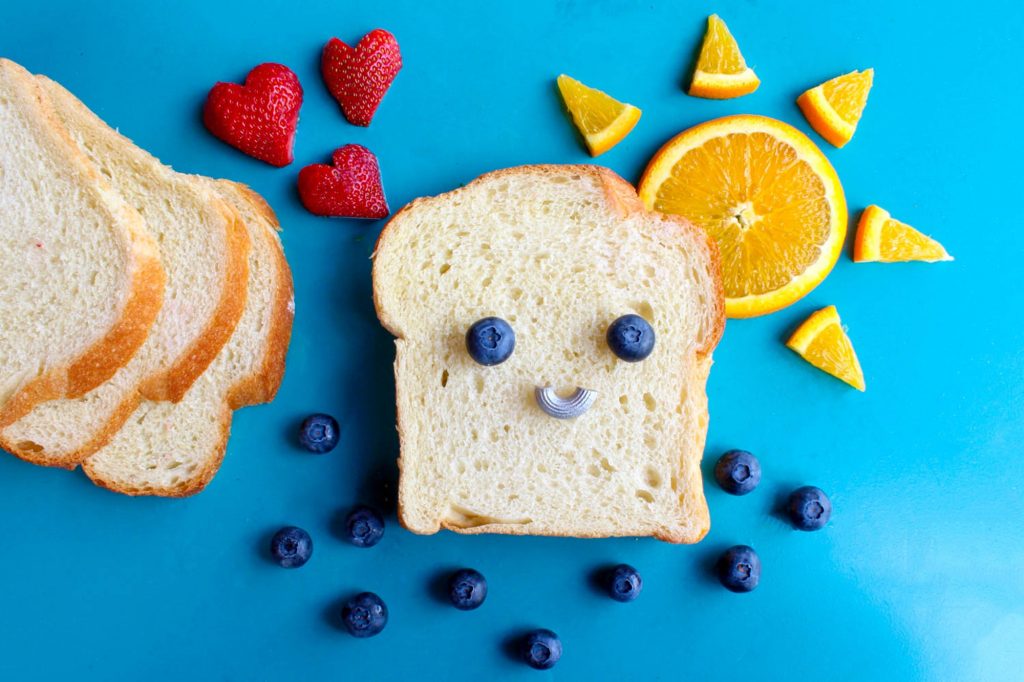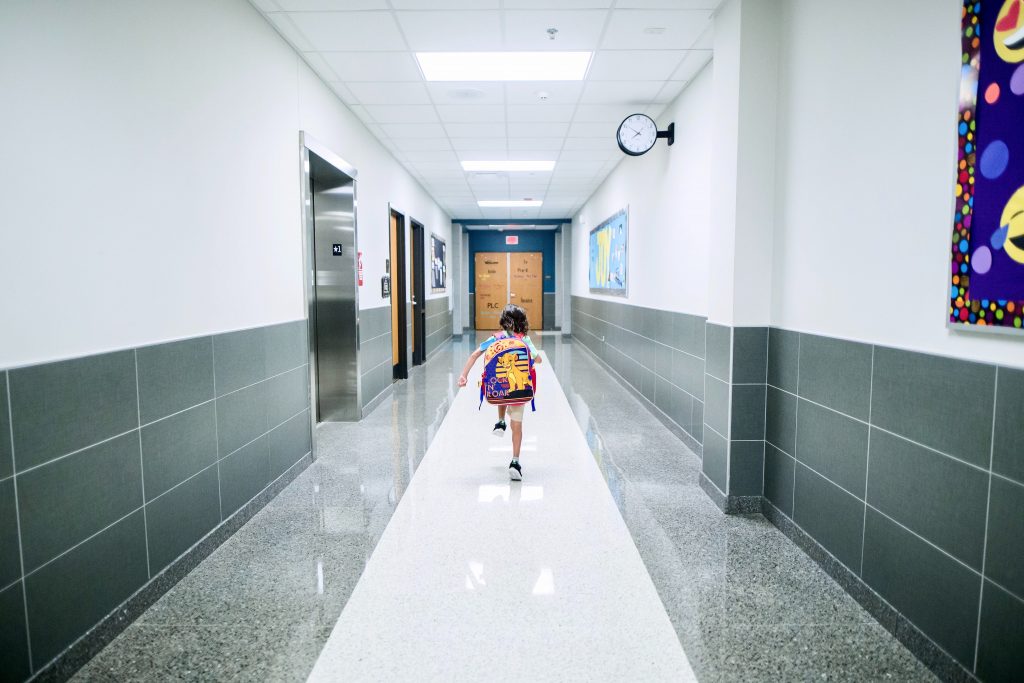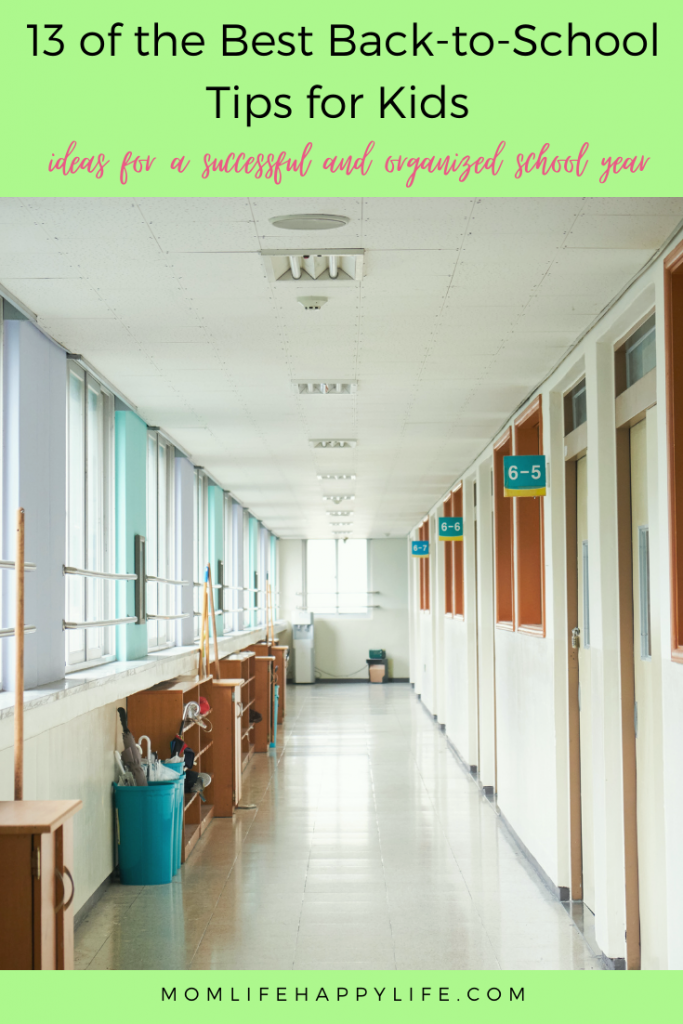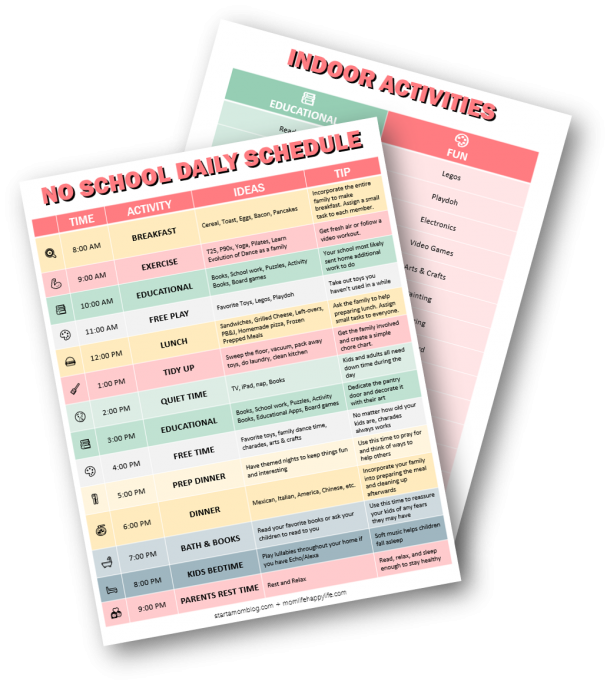The kids are back to school after a long, long unprecedented COVID-19 summer break. It will be a school year like no other. How do you prepare when times are so different? How do you set them up for success and an organized school year?
Your kids may be home for some days and in school on others. It can make things feel hectic.
Here are 15 Back to School organization tips to help kick off the new school year!!
1. Set Up A Homework Area To Stay Organized
Make sure this is away from the tv and away from a high traffic family area. It can be very stressful for a child to get distracted when they are tired from a long day of school, and concentration is a challenge.
A designated homework area is also important because your child can leave the school supplies that they need each day at their desk without feeling like they are often searching and asking for their stuff.
The pressure is high when kids return to school, so keeping their supplies predictable and in order will help prevent added stress.

2. Write Out A Lunch Schedule for Kids
Believe it or not, if you can say to your child on Monday, for instance, “Today is chicken salad day,” it helps their stress.
Why? Because they’ve got a lot of uncertainty, social pressure, performance anxiety, fatigue, you name it, going on.
When something seemingly as little as knowing what their lunch will be is predictable, it can create a sense of structure.
Similarly, you have a lot going on, so if you can make things more structured and predictable, it helps alleviate your stress too.
Write their lunch choices out on a dry eraser board. This will make it easy to glance and see what to buy on your shopping list each week.

3. Make Sure They Are Eating Protein
Nutrition plays a crucial role in a child’s physical and mental health.
Proteins are necessary components, critical for the developing brain and immune system. The 2015–2020 USDA Dietary Guidelines show the daily recommendation of protein each day for children based on their age group.
A high-protein diet reduces hunger and makes you feel more satiated than processed foods or just fruits or vegetables.
It’s especially important to eat protein with each meal and snack, which helps to stabilize your brain energy levels and maintain focus.
Eating the right foods can help your child’s energy level, mood, and mental clarity, which is a recipe for success.
Here are some ideas for kids to get their daily protein intake without having to force them.
High Protein Food For Kids:
Breakfast
Having protein in the morning is important to keep kids satiated and attentive at the start of the day. This could significantly help them stay focused and stave off hunger for a while.
Kid-friendly Breakfast Choices:
- scrambled eggs with cheese
- toast with peanut butter
- oatmeal with fruit and nuts sprinkled on top
- avocado toast
- Yogurt served with crunchy granola, seeds such as pumpkin seeds, with blueberries.
- Tip: consider buying plain yogurt so you can control the sugar you add to it.
Snack Food For Kids
- Keep hard-cooked eggs in the refrigerator. My kids loved to peel them and pour everything bagel seasoning on them!
- Give them nuts to snack on. Add cinnamon or chocolate powder if they need a sweet kick.
- Serve hummus as a snack. Chickpeas are high in protein. Have your kids tried chocolate hummus yet? They’re going to devour it! They won’t mind eating their veggies if it is with chocolate.
- Add nut butter to toast or mixed in with bananas
- Sprinkle seeds or nuts on the food they like, such as fruit, yogurt, or ice cream.
- Keep cheese sticks handy, because most kids love them if they are not lactose intolerant.
Lunch or Dinner For Kids
- Switch to chickpea and lentil pasta. These types of pasta are high in protein and can be cooked the same way you always prepare pasta for your kids.
- Meals such as Chili are a great place to put beans for non-cholesterol protein. You can even make it with just beans and tofu if you want to skip the meat (they only care about the cheese and sour cream anyway!).
- Chicken nuggets with broccoli and cheese
- Tuna mixed with mayo and avocado
- Shrimp with a sweet dipping sauce such as fruit dipping sauce such as orange or apricot marmalade or organic non-fructose added ketchup.
- Ground meat with less fat, such as ground turkey or ground chicken for meatballs, tacos, or Chili
Never forget a protein!
4. Be Clear About Your Expectations for The New School Year
The previous year may have been peppered with miscommunication and failure to complete vital tasks. You will not let that happen this year!
Your expectations should be in writing, so there is proof of a contract between you and your child.
If they come up with a plan for success with you, they are given the power to partner with you in establishing their expectations for the new year.
This gives them a sense of control and, most importantly, it tends to make consequences more accepted by children. This is because they are well aware of what rules they’re breaking since they created them with you.
Partnering with them and giving them makes them feel valued and will help their self-esteem.
They will now have a consistent blueprint to follow to succeed next time and hopefully avoid unwanted consequences more often.
Have them sign a contract in writing and give them a copy to make it more official!

5. Be Clear About Consequences
On the same note, making consequences for not following through with tasks is necessary.
This is because it teaches kids responsibility.
It also teaches them how important it is to follow through with tasks. This way, entering a world later in life that is full of consequences for negative actions will not come as a surprise.
Decide with your children what the consequences will be, such as not seeing friends, loss of phone or computer privileges.
Make them aware you are not creating consequences to punish them or make them feel bad.
Instead, the consequences are set in place to keep them on track and focused.
When it comes to enforcing consequences, one of the best lessons you can teach your child is to be responsible for their actions.
If we allow our kids to feel that they can make an action plan and only stick to it sometimes, we are teaching them how to be inconsistent.
This will lead to incompletion of important tasks and an overall feeling of anxiety for them.
Anxiety comes from a lack of structure, so teach them how to do what they set their minds to and you’ll help increase their self-esteem.
Does Giving Your Kids Consequences Seem too Harsh?
Consider this:
If your manager at work was MIA often, would you take extra time for your lunch break? Maybe come in a little late to work?
The chances are more likely because no one is holding you accountable. This may cause a certain level of stress due to the fear of getting caught.
That’s how your child feels. They will bend the rules more if they know the consequences are sporadic or non-existent. They need to know consequences exist that you’ll hold them to.
Otherwise, there will be too much room for them to potentially skip homework or go to bed late, for instance.
6. Create A Reward System For Completing Tasks
Even more important than consequences for not following through with important tasks, is being rewarded for doing so.
If there are consequences for actions, then shouldn’t your child be rewarded for following through with important tasks?
Of course! Once, they get through the painful process of discussing their consequences, move on the benefits of follow-through!
It’s a big deal to work hard and stay on track with school assignments and it should be treated as such.
Reward Ideas for Your Kids
- A playdate over the weekend
- Their favorite food prepared for them
- A token system in which doing their homework three times in a row equals a prize
- 10 minutes extra video game or phone time
- 10 minutes extra time before bed
7. Set Them Up For Success
A great way to set your child up for success is to provide them with organizational tools.
Introduce Your Child To Organizational Tools
- A day planner is key to keeping all assignments in one place.
- A Whiteboard is great to keep by their desk and remember important due dates.
- A different color folder for each subject can help them move more quickly.
- Sticky tabs are helpful to mark important reference material.
- A file folder can help to organize loose papers by subject.
- Highlighters will also be necessary to make important facts stand out on the page.

8. Set Time For Kids To Express Their Feelings
This time is beneficial because if kids had a good day they can get excited again by telling you all their good news. Kids love to see their parents enjoy their success or happiness.
If something or someone is getting in the way of your child having a healthy self-concept, you need to know about it early.
This way, you can intervene by alerting their school or teaching them how to handle difficult situations.
More importantly, you can teach them how to express themselves and how to plan for similar future events in which they felt powerless to a situation or person.
Consider this example:
Your child comes home and you ask them how their day went? You can see the sadness all over their face. They tell you another kid was mean to them and embarrassed them in front of all of the other kids.
You can take this as an opportunity to role-play how they can respond to take control of the situation.
For instance, you may explain to them why kids can be mean (i.e. trouble at home, not doing well in school).
Then, you may want to have them prepare something they can say to the kid to express that they are not okay with how they are treating them so they don’t feel powerless or silenced.
If you didn’t take the time to ask them about their day, they may not mention anything and feel powerless to upsetting situations.
9. Carve Out Quality Time For Your Child
Sometimes, it can be easy for kids to feel overwhelmed by the demands of a new school year.
Instead of pestering your kids with questions about school, all that’s on the syllabus is play and relaxation.
Even just half an hour will make a difference in your child’s mood. It will remind them that it doesn’t have to be all business Monday-Friday.
Ideas For Quality Time With Your Kids
- Go for a walk
- Take them for frozen yogurt
- Do arts and crafts together
- Play a card game
- Eat their favorite snack with them
- Get their happy hormones going with a game of tag
- Have them help you prepare dinner

10. Schedule “Unloading Time” Before Bed
This is a little different than setting time for your kids to express their feelings.
This is because you’re asking your child to unload their worries and “what if” thoughts in the hopes that they won’t weight on their mind before sleep.
It is best done no later than a half an hour before the kids go to sleep so worries don’t weigh on their mind right before bed.
It is specifically a time set to have them express their worries and try their best to propose a potential solution with your guidance.
If your children can learn how to problem-solve their emotional challenges early on with your help, they become better at doing this on their own later on.
As a result, this will become more automatic as they become more independent.
Give them the chance to express their concerns so you can help them see things they feel are catastrophic from a different perspective.
Ideally, you want to guide them toward challenging negative beliefs that are not based in fact but feeling.
Feelings aren’t enough for your child to firmly create a belief that causes them pain.

How To Help Your Child Challenge Negative Thoughts
Example:
Child: “Mr. Smith (teacher) hates me.”
Mom: “What makes you feel your teacher hates you?
Child: “ He always laughs at Tyler’s jokes, but not mine.”
Mom: “Is he mean to you?”
Child “No, but he is nice to other kids, but not me.”
Mom: “I see. Does he ever say things like you did a good job, or keep up the good work?”
Child: “Yea, sometimes.”
Mom: “So that’s evidence enough to say that he doesn’t hate you right? Because typically when someone hates someone else they are mean to them and probably wouldn’t tell them they did a good job.”
Child: “Yea, I guess.”
Mom: “If you tell yourself Mr. Smith hates you because he maybe seems nicer to other kids or laughs at their jokes, that probably makes you feel pretty bad right?”
Child: Yes.
Mom: “What can you tell yourself about how Mr. Smith feels towards you to make yourself feel better?”
Child: Maybe Mr. Smith doesn’t think I’m that funny, but he doesn’t hate me.”
Mom: That’s great, good start!
This helps them understand there are multiple ways to look at one situation, not only negatively or to an extreme.
11. Set Aside 15 Minutes For A Relaxation Exercise
Relaxation exercises are a great daily routine for kids to use to melt away their tension.
Incorporating time for meditation, breathing exercises, or progressive muscle relaxation are just some strategies that kids can use to relax their mind and body.
These techniques are easy to find on a google search and there is a ton of video demonstrations out there for them to watch and learn.
12. Help Them Organize The Night Before
Mornings where everyone is yelling over each other and screaming things such as “Get dressed, we are running late” start a child’s day off in a chaotic state. This could snowball into an overall stressful day.
Ways You Can Organize The Kids The Night Before School
Clothes are laid out, schoolwork is done, all school materials are in their backpack. You can have their snacks and lunch prepared the night before.
Mornings will be a lot smoother with night preparation!
13. Take Mini Breaks
As an adult or a kid, we often convince ourselves that we need to keep working.
If you’re noticing your child is moody or showing signs of mental fatigue, recommend they take a break.
Trying to work through it, will likely cause your child to take longer to complete tasks and remember information less. This is because they are on the verge of burning out.
Just a 10-15 minute break is enough to reset your child’s motivation, energy level, and the time you spend working on an assignment.
A good rule of thumb is to have your child take a 10-15 minute break for every hour that they’re putting in work or study time.
This could be to go for a walk, grab a snack (preferably one with protein!), “check-in” with how they’re doing, or to find a way to make them laugh so they relax a little!
The TakeAway
Tips like these can help instill organizational skills in kids they can use for years to come. Strategies such as these can help your child learn to handle difficult situations that come their way and improve their self-esteem.
Assist your child in decreasing the chaos in their life and set them up for success!
What are some tips you find important to help get your child organized for a new school year? Share your successes below. For tips and strategies to stress less everyday visit me at stresslessmillennial.com.





